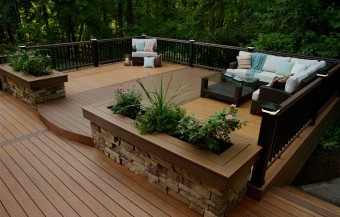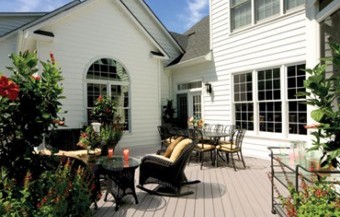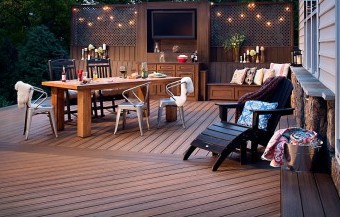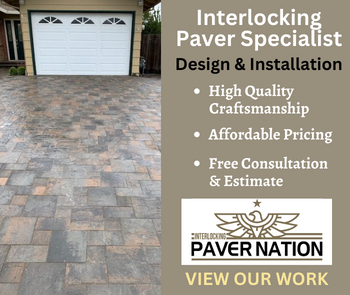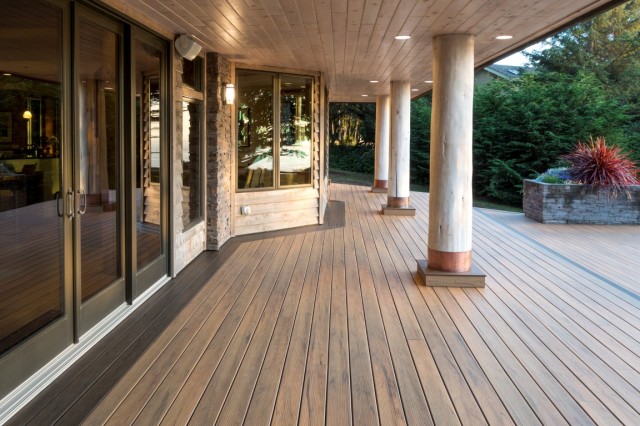

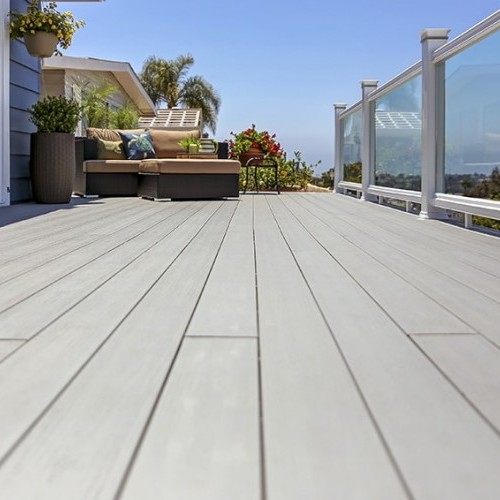
Why Going Composite for your New Deck is the Right Choice
Six reasons that make it easy to understand the value and advantage of composite decking.
If you’ve been planning your deck for a while, you’ve probably run into the composite vs. wood decks debate. For the newcomers, it’s a question of materials; older decks tend to be wood, while many newer decks consist of a “composite” wood/plastic combination.
We’re gonna come right out and say it: we prefer composite. And not without good reason. After years of developing high performance TimberTech materials, we’ve narrowed down the “benefit of composite decks” argument to an easy short list. Here are the six reasons why you might consider skipping the lumber and going composite for your project.
.jpg) 1. Rot and Warp
1. Rot and Warp
Have any rain around your home? Part of deck ownership is dealing with water management; in choosing your materials, you’re deciding how much you’re going to face.This is what we’re talking about when we say that composite is “durable.” Changes in precipitation/temperature have a tendency to warp or rot any and all outdoor materials, but some will hold up better than others.
Wood, for example, has a tendency to accumulate mildew unless constantly supervised, and can warp drastically as the boards dry out after, say, a winter thaw or an epic thunderstorm. Composite holds up far better, resisting change even in extreme weather conditions. That’s why all TimberTech decks have a 25 year limited warranty, so if the storm of the century does hit your backyard, you’ll have one less thing to worry about.
(Note: You might find sites that slam composite for warping worse than wood. Check the date of the post — this was somewhat true — about fifteen years ago, when composites were just entering the industry. It’s still important to purchase wood composite decks from companies who have experience and a track record like TimberTech. New technologies and manufacturing techniques have come a long way.)
2. Upkeep
Like durability, “low-maintenance” gets thrown around as one of those deck-keeping catchphrases. What exactly does it mean? Basically, how frequently you’ll need repairs, and how frequently you’ll need to sand, stain, clean, and power wash.
Composites are low-maintenance. They clean quickly, they rarely need repairs, and their fixes are quick and easy (also, remember that 25 year warranty? Isn’t that sounding better and better?). Upkeep will take minimal energy, so you’re spending most of your time enjoying the backyard instead of maintaining it.
Wood, not so much. To keep your deck at tip-top shape, you’ll need treatment repairs every two years and complete sanding and stripping every six. That’s just for basic check-ups. Some experts even warn against washing your own deck; you should consider hiring a professional so as not to warp the wood.
In our opinion, you don’t want to skimp on the front end and face costs later on. Our friends at Angie’s List estimate that, over an 11 year period, a wood-deck owner will spend $4,600 dollars on upkeep. That’s what we call “high-maintenance.”
 3. Splintering
3. Splintering
I remember visiting a family friend’s lake house for a summer, spending every day in the water and every evening tweezing dozens of micro-slivers from my toes. Yes, I have a bit of a grudge against splinters.
If you have kids, pets, or maybe just prefer to spend a morning cup of coffee barefoot, you’ll need to consider splintering. Sure, you could renew with periodic sanding and varnishing of your wood deck to keep everything smooth and safe.
Or you could go composite. No splinters.
4. Stains, Scratches, and Bug-life
Day One, your deck is going to look perfect, the corners crisp, the paint gleaming, everything just as you imagined it. From then on, it’s a battle against time. Your neighbor spills red wine, the kids skate board on it, the sun and rain will try to contribute to the daily wear and tear.
Composites will fare better, longer. The material resists nicks, scratches, and stains to keep your sidings and corners clean. And TimberTech caps its boards on all four sides to make sure the deck is protected against stains, scratches, moisture and bugs — even on the bottom where you wouldn’t see a problem creeping up. You’ve spent all this time getting your deck just right; the least your deck can do is stay that way.
5. Design
In a perfect world, your deck will serve as a seamless extension from your house, keeping with design and style as you transition from inside to out. And, most likely, you’re not going to overhaul the living room/kitchen/breakfast nook all to match your new deck.
Thankfully, composites come in many styles, colors, and textures, so you can dictate the look and feel of your deck. TimberTech offers a range of options, so you can set a classic look with “Legacy”, feature warm textures with our “Tropicals” or embrace earthier tones with “Terrain.” Browse our website to establish your deck’s style from the ground up and check out our TimberTech apps to play with designs, colors and deck and railing combinations.
6.Safety Hazards
Until 2003, nearly all wooden decks contained a preservative called Chromated Copper Arsenate (CCA), which the EPA lobbied against for its dangerously high arsenic levels. Even so, many lumber companies still use CCA as their main preservative. Wood treated with CCA will leach arsenic at abnormal rates when wet, making it unsafe to touch and contaminating nearby plant life.
Composites don’t have CCA, but if you do decide to go with a wood deck, be sure to ask about the CCA levels in your materials. CCA leaching, whether from a rainstorm or a simple washing, can create serious risks to humans, pets, and the environments.
And there you have it. Yes, we’re composite fans. But if you’re still skeptical, feel free to use these six bullets as starting points for your own research. It all comes down to what you personally are looking for. And if that includes saving money, perfecting design, and spending less effort, composite might be what you’re looking for.
Find your local Decking Contractors in our Homeowners Improvement Guide >>
